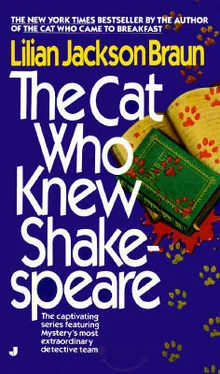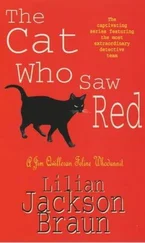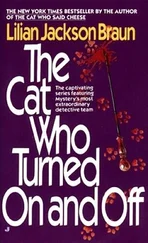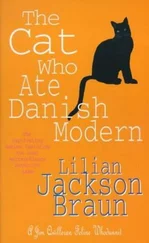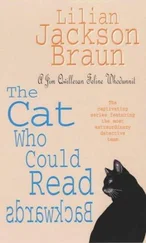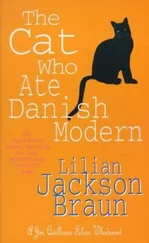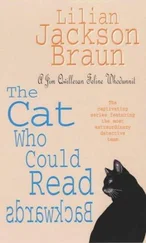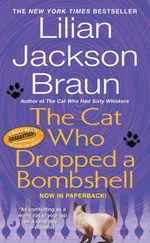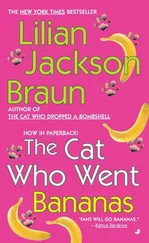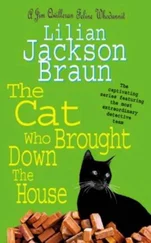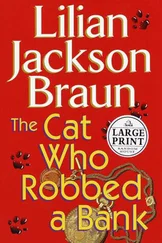Lilian Braun - The Cat Who Knew Shakespeare
Здесь есть возможность читать онлайн «Lilian Braun - The Cat Who Knew Shakespeare» весь текст электронной книги совершенно бесплатно (целиком полную версию без сокращений). В некоторых случаях можно слушать аудио, скачать через торрент в формате fb2 и присутствует краткое содержание. Жанр: Классический детектив, на английском языке. Описание произведения, (предисловие) а так же отзывы посетителей доступны на портале библиотеки ЛибКат.
- Название:The Cat Who Knew Shakespeare
- Автор:
- Жанр:
- Год:неизвестен
- ISBN:нет данных
- Рейтинг книги:4 / 5. Голосов: 1
-
Избранное:Добавить в избранное
- Отзывы:
-
Ваша оценка:
- 80
- 1
- 2
- 3
- 4
- 5
The Cat Who Knew Shakespeare: краткое содержание, описание и аннотация
Предлагаем к чтению аннотацию, описание, краткое содержание или предисловие (зависит от того, что написал сам автор книги «The Cat Who Knew Shakespeare»). Если вы не нашли необходимую информацию о книге — напишите в комментариях, мы постараемся отыскать её.
The Cat Who Knew Shakespeare — читать онлайн бесплатно полную книгу (весь текст) целиком
Ниже представлен текст книги, разбитый по страницам. Система сохранения места последней прочитанной страницы, позволяет с удобством читать онлайн бесплатно книгу «The Cat Who Knew Shakespeare», без необходимости каждый раз заново искать на чём Вы остановились. Поставьте закладку, и сможете в любой момент перейти на страницу, на которой закончили чтение.
Интервал:
Закладка:
“Can’t believe nothin’ they say on radio. That storm from Canada blowed itself out afore it got anywheres near the border.”
“Where’d it happen?” the hunter asked. “The accident, I mean.”
“Old plank bridge. It’s a bugger! We been after the county to get off their duff and widen the danged thing. They say he rammed the stone rail, flipped head over tail, landed on the rocks in the river. Car caught fire. It’s a closed casket, I hear.”
“They should sue somebody.”
“Prob’ly goin’ too fast. Mebbe hit a deer.”
“Or coulda been he was on a Friday night toot,” the hunter said with a sly grin.
“Not him! She’s the one that’s the barfly. With him it was never nothin’ but work work work. Fell asleep at the wheel, betcha. Whole family’s jinxed. Y’know what happened to his old man.”
“Yeah, but he probl’ly deserved it, from what I hear.”
“And then there was his uncle. Somethin’ fishy about that story!”
“And his grandfather. They never got the lowdown on what happened to him. What’ll they do with the paper now?”
“The kid’ll take over,” the farmer said. “Fourth generation. No tellin’ what he’ll take it into his head to do. These young ones go away to school and get some loony ideas.”
Voices hushed as the bell began to toll a single solemn note and the casket was carried from the church, followed by the bereaved family. The heavily veiled widow was accompanied by her elder son. Junior walked with his sister from Montana. On the sidewalk and in the park the townspeople crossed themselves and men removed their headgear. There was a long wait as the mourners moved silently to their cars, directed by young men in black car coats and ambassador hats of black fur. At a signal, men in uniform fell into rank and hoisted brass instruments. Then, with the Pickax Funeral Band playing a doleful march, the long line of cars started to move forward.
Qwilleran pulled down the earflaps of his winter hat, turned up his coat collars, and headed across the park to the place he now called home.
The Klingenschoen residence that Qwilleran had inherited was one of five important buildings on the Park Circle, where Main Street divided and circumvented a little grassy plot with stone benches and a stone foundation. On one side of the circle were the Old Stone Church, the Little Stone Church, and a venerable courthouse. Facing them across the park were the public library and the K mansion, as Pickax natives called it. A massive cube of fieldstone three stories high, the mansion occupied its spacious grounds with the regal assurance that it was the most impressive edifice in town, and the costliest.
For a man who had chosen to spend his adult life in apartments and hotels, always on the move like a gypsy, the palatial residence was a discomfort, an embarrassment. Eventually Qwilleran would deed it to the city as a museum, but for five years he was doomed to live with the Klingenschoen brand of conspicuous consumption: vast rooms with fourteen-foot ceilings and ornate woodwork; crystal chandeliers by the ton and Oriental rugs by the acre; priceless French and English antiques, and art objects worth millions.
Qwilleran solved his problem by moving into the old servants’ quarters above the garage, while the housekeeper occupied a sumptuous French suite in the main house.
Housekeeper was a misnomer for Iris Cobb. A former antique dealer and appraiser from Down Below, she now functioned as house manager, registrar of the collection, and curator of an architectural masterpiece destined to become a museum. She was also an obsessive cook who liked to putter about the kitchen — a dumpy figure in a faded pink smock. Despite her career credentials the widowed Mrs. Cobb baked endless cookies and pies with which to please the opposite sex, and she was inclined to gaze at men worshipfully through her thick-lensed eyeglasses.
Mrs. Cobb had a hearty oyster stew waiting for Qwilleran when he returned from the funeral. "I looked out the window and saw all the cars," she said. "The procession must be half a mile long!"
"Longest in Pickax history," Qwilleran said. "It's not only the funeral of a man; it may turn out to be the funeral of a century-old newspaper."
"Did you see the widow? She must be taking it terribly hard." Mrs. Cobb related emotionally to any woman who lost a husband, having experienced two such tragedies herself.
"Mrs. Goodwinter's three grown children were with her — also an older woman, probably Junior's Grandma Gage. She was tiny, but as straight as a brigadier general... Any phone calls while I was out, Mrs. Cobb?"
"No, but a busboy from the Old Stone Mill brought over some pork liver cupcakes. It's a new idea, and the chef would like your opinion. I put them in the freezer."
Qwilleran grunted in disgust. "I'll give that clown an opinion — fast! I wouldn't touch a pork liver cupcake if he paid me!"
"Oh, they're not people food, Mr. Q! They're for the cats. The chef is experimenting with a line of frozen gourmet dinners for pets."
"Well, take a couple out of the freezer, and the spoiled brats can have them for supper. By the way, have you noticed any books on the floor in the library? Koko is pushing them off the shelf, and I don't approve of his new hobby."
"I tidied up this morning and didn't notice anything."
"He's particularly attracted to those small volumes of Shakespeare in pigskin bindings. Yesterday I found Hamlet on the floor."
Behind Mrs. Cobb's thick lenses there was a mischievous twinkle. "Do you think he knows I've got a baked ham in the fridge?"
"He has devious ways of communicating, Mrs. Cobb, but that would be a new low," Qwilleran said. "What is today? Monday? I suppose you're going out tonight. If so, I'll feed the cats."
The housekeeper's face brightened. "Herb Hackpole is taking me out to dinner — somewhere special, he said. I hope it's the Old Stone Mill. They say the food's wonderful since the new chef took over."
Qwilleran huffed into his moustache, a private sign of disapproval. "It's about time that skinflint took you out to dinner! It seems to me you always go over to his place and cook for him."
"But I like to!" Mrs. Cobb said, with her eyes shining.
Hackpole was a used-car dealer with a reputation for being obnoxious, but she found him attractive. The man had red devils tattooed on his arms and wore his thinning hair in a crew cut, and he often neglected to shave, but she liked men in the rough. Qwilleran recalled that her late husband had been an uncouth lout and she loved him deeply. Now, since starting to date Hackpole, her round cheerful face had become positively radiant.
"If you want to have someone in for dinner," Mrs. Cobb said, "you can serve the baked ham, and I'll make the ginger-pear salad you like, and I'll put a sweet potato casserole in the oven. All you have to do is take it out when the bell rings." She was acquainted with Qwilleran's helplessness in the kitchen.
"That's very thoughtful of you," he said. "I might invite Mrs. Duncan."
"Oh, that would be nice!" The housekeeper's expression was conspiratorial, as if she sensed a romance. "I'll set the marquetry table in the library with a Madeira cloth and candles and everything. It will be nice and cozy for two. Mr. O'Dell can lay a fire with those applewood logs. They smell so good!"
"Don't make it too obviously seductive," Qwilleran requested. "The lady is rather proper."
"She's a lovely person, Mr. Q, and just the right age for you, if you don't mind me saying so. She has a lot of personality for a librarian."
"It's a new trend," he said. "Libraries now have fewer books but a lot of audiovisuals... and champagne parties ... and personality all over the place."
After lunch Qwilleran walked around the Park Circle to the public library, which masqueraded as a Greek temple. It had been built by the founder of the Picayune at the turn of the century, and a portrait of Ephraim Goodwinter hung in the lobby, although it was partly obscured by a display of new video materials and there was a slash in the canvas that had been poorly repaired.
Читать дальшеИнтервал:
Закладка:
Похожие книги на «The Cat Who Knew Shakespeare»
Представляем Вашему вниманию похожие книги на «The Cat Who Knew Shakespeare» списком для выбора. Мы отобрали схожую по названию и смыслу литературу в надежде предоставить читателям больше вариантов отыскать новые, интересные, ещё непрочитанные произведения.
Обсуждение, отзывы о книге «The Cat Who Knew Shakespeare» и просто собственные мнения читателей. Оставьте ваши комментарии, напишите, что Вы думаете о произведении, его смысле или главных героях. Укажите что конкретно понравилось, а что нет, и почему Вы так считаете.
